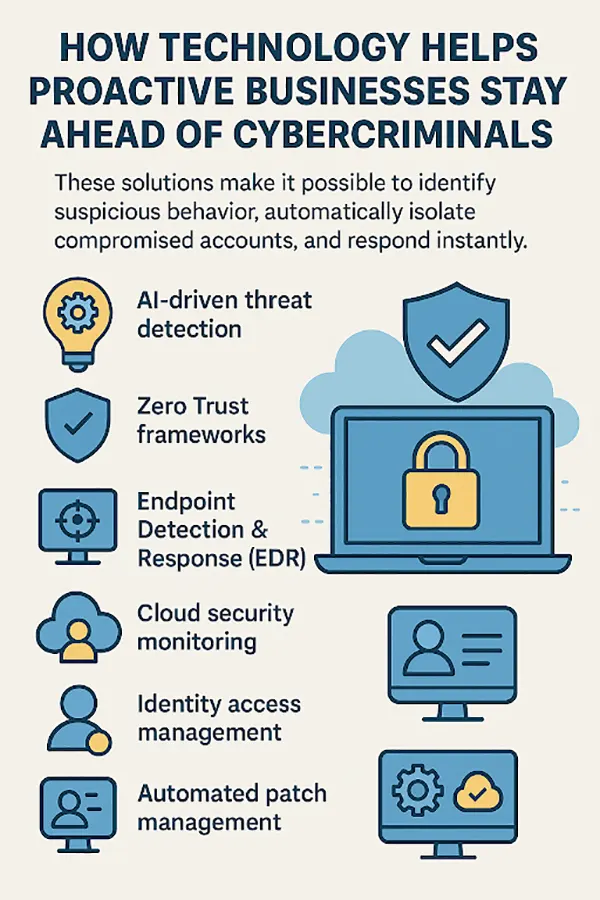Let me take you back to 2017, when Equifax, one of the biggest credit bureaus in the world, found itself in a compromising position. What happened was that an unpatched vulnerability became the reason for a huge data breach, affecting more than 147 million people.
Well, you might have heard about more such cases that made headlines. Every year, the average cost of a data breach is $4.44 million (Source: Viking Cloud ). Sounds scary, doesn’t it? But what’s scarier is that you never know when your business might become the next headline.
And this is exactly why modern businesses need proactive security strategies that allow them to stay a step ahead of cybercriminals and protect their organization and its reputation.
This post discusses this topic in depth. So, continue reading to learn how shifting to a proactive approach can save your business.
KEY TAKEAWAYS
- Continuous penetrating testing can help businesses identify vulnerabilities before hackers do.
- Reactive security can cost a business its reputation, consumer trust and obviously money.
- Building a security-first culture is non-negotiable.
- Technology can significantly help stay ahead in the security landscape.
- Compliance with industry standards can help businesses build consumer trust.
- Businesses achieve long term success with the right roadmap.
Cybercriminals are always on the lookout for weak points in systems. It can be outdated software, unpatched systems, weak passwords, open ports or misconfigured cloud services. The possibilities are unlimited, and this is exactly why businesses must construct their walls high to prohibit anyone with malicious intent from crossing them. Monitoring these potential entry points often requires specialized software, such as a Dark Web scanning tool, to ensure company credentials haven’t already been compromised and sold to the highest bidder.
By internal security audits, regular vulnerability scans, reviewing access control, and continuous penetration testing, businesses can identify their vulnerabilities before the outside threats do, and hence eradicate them.
DO YOU KNOW?
Weak passwords are one of the biggest reasons attackers gain access, which means that hackers don’t really hack most businesses; they just log in by guessing the passwords.
As it is said, Prevention is better than cure, the same way fixing an attack after it happens is always more expensive and might take a bigger hit on a business’s workflows and reputation. It can lead to serious consequences, including downtime and halted operations, lost customer trust, legal penalties, and costly data restoration.
No matter how much an organization had performed, a single blow can take them back a few years in their progress. And this is the reason, a proactive approach to security is not just an IT investment but a financial shield and a smarter defence.
Employees are one of the biggest assets for any business, but they can also be the weakest link, especially in cases of phishing, password reuse, or accidental file sharing. That is why building a security-first culture should be non-negotiable for any firm. Businesses can build smart teams that prioritize security in the following ways:
These may sound like some simple steps, but most companies fail to follow these and become victims of digital breaches.
The biggest defense weapon that businesses have today is “Technology”. Advanced tech tools can help them detect and block threats faster than any human could ever do. The infographic below shows how proactive businesses use technology for protection:

A company can never succeed without its customers’ trust. The consumers want to be valued and believe that they and their personal credentials are taken seriously. And one of the best ways to build customer trust is by adhering to legal rules and regulations based on industry standards. The majority of the industries now require strict compliance frameworks such as GDPR, SOC2, HIPAA, and PCI DSS.
Following a proactive security approach helps businesses meet compliance requirements faster, maintain data-handling practices, stand out in the competitive market, and also win the trust of privacy-conscious customers. Solutions such as a password manager for enterprises support compliance by centralizing access control, improving audit readiness, and ensuring sensitive credentials are handled securely.
Security is not a one-step process, and with the evolving threats, it is definitely not something you do once and forget. It is a long term strategy that must evolve with a business to ensure success.
One thing in this digital economy is certain that only the businesses that stay prepared and a step ahead of potential Cyberattacks can achieve excellence in the future. For this, they must create an effective roadmap. A good framework should include the following points:
A well-framed road map can help organizations stay focused and prepared for everything that might come in their path.
In conclusion, proactive security strategies are no longer optional for modern businesses. Currently, the only way for businesses to protect themselves from cyberattacks is by finding vulnerabilities early, investing in continuous testing, using smart technologies, and building a security-first culture.
Implementing robust cyber systems is no longer optional for businesses, as it helps them protect their customer data.
Proactive security means prioritizing identifying, anticipating, and preventing cyberattacks before they happen.
The main purpose of a security strategy is to provide a roadmap to implement effective defense mechanisms, respond to incidents, and maintain a robust security posture.
The 5 C’s in security are Change, Compliance, Cost, Continuity, and Coverage.
